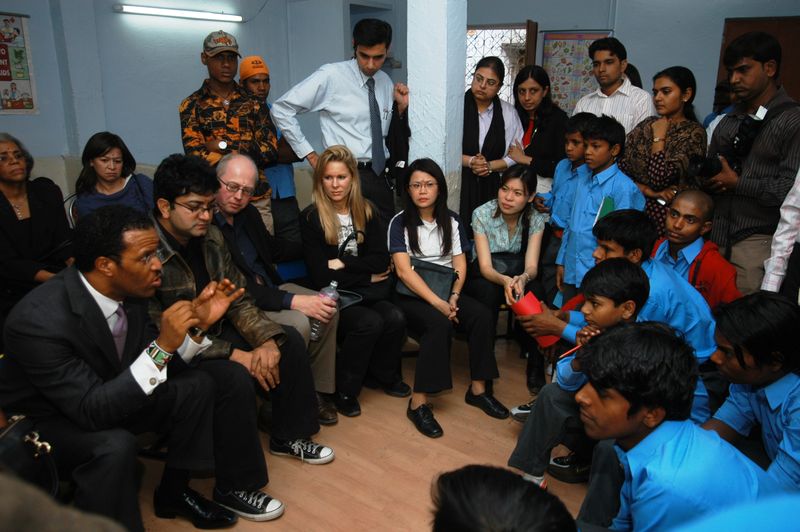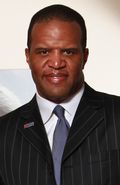
Photo credit to Forum of Young Global Leaders and World Economic Forum, during meeting in India.
As former President of Finland President and Nobel Peace Prize winner Martti Ahtisaari said before the International Youth Foundation Leadership & Livelihoods Summit, “as we all know, the world economic crisis has spurred a record increase in global unemployment – dragging down economies and dimming hopes for the future. Young people are particularly vulnerable to the ups and downs of the global economy. Recent statistics reveal that the greatest number of youth ever – from 80 to as many as 100 million – were unable to find jobs last year; and in just the past two years, as a result of the global recession, 7.8 million more young people joined the unemployment rolls." President Ahtisaari went on to say, “…with 1.3 billion young people standing on the threshold of adulthood — time is running out. We need concrete solutions and real commitments.” I agree 100% with President Artisaari. But I want to go further.
Respectfully, I do not believe the world is going through a recession. I believe this is a reset.
A reset that will certainly impact the world over time, and for generations to come. Let me explain both the core "jobs" problem, and more so at least one of practical solutions.
Peeling back another layer on the above statistics, there is an estimated 100 million jobs needed within the next decade or less (source: World Economic Forum), in the Middle East alone. This is a region where soon, approximately 60% of the population will be under the age of 25. Think ambitious, frustrated, upset, more uneducated than not, young people in the Middle East — 100 million of them. Now, fast forward to Egypt, Tunisia, Libya and other parts of the Middle East, over the past six weeks, and it all begins to come together.
The problem in Egypt is not so much a lack of democracy, which it also needs, but rather a lack of relevant prosperity. When then President Mubarak took over, he did so following President Sadat’s assassination, whom he was sitting next to at the exact moment he was killed. That was a searing moment for Mubarak. And so, Mubarak quickly decided that his tenure would be marked by so-called “stability.” Fast forward 30-plus-State-of-Emergency-imposed years later, and even with positive GDP growth in Egypt, and someone might ask, “what’s wrong with that?”
What’s wrong is the population of Egypt doubled during Mubarak’s reign, from approximately 35 million to approximately 80 million.
What’s wrong is that GDP growth effected only a shallow, and decades-on fairly narrow component of the Egyptian population. In other words, an upscale elite segment within Egypt.
What’s wrong in Egypt is poverty grew in lock-step with a more Internet-connected, more educated youth population, and that parents looked at their lives and said, “…this reality might have been acceptable to me, but I refuse to accept ‘a future of no future prosperity’ for my children.”
The problem in Egypt and many other parts of the Middle East is a fundamental lack of practical hope, opportunity, and of course, the real problem is poverty. People, and especially young people, who simply cannot see a brighter future ahead of them. Enter Al-Qaeda, and all of the irrational hope that they provide.
Parts of the Middle East may in fact be stuck in a model that is some 50 years or more behind the rest of the world, but the youth there share one problem with every other young person now entering adulthood in every other part of the world today — they are nervous, and maybe even downright depressed, about their future. This is a problem. As I have said in my book LOVE LEADERSHIP: The New Way to Lead in a Fear-Based World (Jossey-Bass), “the most dangerous person in the world is a person with no hope.”
Part of the coming RESET includes a generation of young adults, graduating into adulthood, and even from colleges and universities, with little to no prospects for a traditional job to meet them. Adding insult to injury, major companies that pulled back in the midst of this global economic crisis and laid off workers, becoming more efficient, really have no intention of hiring all of these individuals back. Their call for downsized efficiency was a permanent “reset” or they would say "rightsizing" of these companies. Accordingly, folks will need to find something else to do, and quick.
The Jobs Solution in a RESET World
What youth in the Middle East need is the same thing that youth in America, Europe, Africa, Latin America, Asia and the rest of the world need now – and that is the launch of a global generation of youth entrepreneurship.
Individuals, seeing a wall in front of them, who decide to find a way over it, under it, around it or through it. Individuals that decided to in effect create their OWN job.
What the world needs now is a generation of entrepreneurs, small business owners and self-employment projects.
What the world needs now is to understand that every big business started out as a small business, and before that, someone’s “idea.”
Facebook, which helped to spark the movement in Egypt, was someone’s “idea.” Now it is 600 million strong, and global.
Twitter, which didn’t even exist 10 years ago, was someone’s “idea.” Now most everyone talks of "tweets," and assumes everyone else knows what they mean.
Microsoft and Apple were Bill Gates and Steve Job’s “idea," respectively.
Operation HOPE, was my idea following the worst civil unrest in the history of the United States; the Rodney King riots. Today, Operation HOPE has served more than 1.5 million individuals, delivered more than $1 billion in economic value in and for under-served communities, has 13,000 plus HOPE Corps volunteers, approximately 5,000 partners from government, community and the private sector and serves 70 urban communities throughout the U.S. (making HOPE the largest urban delivery system for financial literacy empowerment in the nation), Haiti, South Africa and as of last week, Morocco.
The 20th century was about emerging democracies, led by young people, all over the world. The way the average person “felt” this sense of democracy in their own life, was the right to vote.
Today, in the 21st century, we live in an economic era, powerfully marked by the global economic crisis. In this environment, if you don’t understand the language of money (financial literacy), and if you don’t have a bank account, you are an economic slave.
Today, financial literacy is the new civil right in every remotely free country, and the first global silver rights empowerment tool for all.
What we need to do now, in America, in the Middle East, Africa and every country around the world, is to teach an entire generation of young people financial literacy empowerment (and job creation), and to make sure they have the dignity and respect of a mainstream bank account, and the ability to do for themselves.
What they (youth) need now is to use this new-found knowledge about “how the economic world works” to create new opportunity for themselves
, and not wait for the government or anyone else to solve their problem for them. Partly because our lives is ultimately our responsibility, and partly because governments simply cannot and should not do it all.
Ladies and gentlemen, we are living in a world on RESET.
Those who know me also know that I genuinely admire PhD’s, and the world needs more of them (mostly in economics and the sciences), but I what I actually want to be is a PhDo. And so, last week I was proud to stand in partnership with Wikipedia and Wikia founder Jimmy Wales (my fellow Young Global Leader), and Casablanca Stock Exchange CEO Karim Hajji and our HOPE Global Spokesman Ambassador Andrew Young, as well as the US Ambassador for Morocco, as we launched the Wikia-HOPE Global Money Initiative (Wikia-HOPE), now operational in and for the people of Morocco.
Wikia-HOPE now represent the world’s first global financial literacy curriculum, translated and oriented into local languages and cultures, starting now with Arabic, (North African) French, Spanish and English. 45 languages are yet to come for Wikia-HOPE, with the help of the newly empowered generation of young people who are looking to take their lives back, and who through this tool, can do it for themselves. Some of the same young people, I might add, who were calling for their freedom on the eStreets of the Middle East in recent weeks.
Rainbows only follow storms. You cannot have a rainbow without a storm first.
Let’s go.
Onward with HOPE
A special thank you to my friend and fellow Global Dignity co-founder Professor Pekka Himanen, one of the leading philosophers in the world today, for inspiring me to write this piece.
For a continuation of this discussion around 21st century innovation and ideas, or as President Obama describes as "Winning The Future," see my recent piece in the Huffington Post entitled "Cracking the Code: Why Countries Succeed and Fail, and What We Need To Do Next." Leave your comment here or there. Join the discussion about our future.

John Hope Bryant is founder, chairman and CEO of Operation HOPE, bestselling author of LOVE LEADERSHIP: The New Way to Lead in a Fear-Based World (Jossey-Bass), and a member of the U.S. President's Advisory Council on Financial Capability for President Barack Obama
